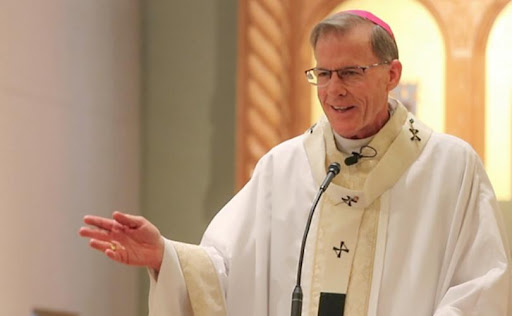
Archbishop John C. Wester
Today’s reflection is from Archbishop John C. Wester, who was appointed to lead the Archdiocese of Santa Fe by Pope Francis in 2015.
Today’s readings for the 31st Sunday of Ordinary Time are available here.
A few years back, I went for a hearing test. The audiologist, sitting on the other side of the soundproof booth, covered her mouth with a piece of paper and spoke the word “lohs” into my earphones. I repeated the word as instructed and then told her that there was no such word as “lohs.” She replied, I didn’t say “lohs,” I said “loaf.” I now have hearing aids! And I also appreciate the gift of hearing more than ever. Today’s Gospel, accompanied by the first reading from Deuteronomy, reminds us even more of how important it is to hear, especially on a deeper level.
In Mark’s Gospel reading for today, we hear Jesus responding to the scribe who asked him, “Which is the first of all the commandments?” Jesus replies by quoting from Deuteronomy 6 (today’s first reading) and from Leviticus 19, combining love of God and love of neighbor. Notice that Jesus and Deuteronomy preface these two commandments with the great revelation that God is One: “The Lord our God is Lord alone!” This great truth has galvanized the faith of the Jewish people, and that of Christians, for centuries. The entire verse from Deuteronomy, and the prayer that would be fashioned after it, is known as the Shema Prayer because the word that introduces the entire pericope, “shema” means “listen” or “hear”: Hear, O Israel. Listen up, pay attention. Hence, Jesus’s answer to the scribe is first to listen to what God has been saying down through the corridors of time: listen to God, listen to the one speaking to you, the Messiah.
The late Father Joseph Donders, a missionary in Kenya, said that Jesus’s answer to the scribe is contained in the word “listen”: “That one word indicated all the rest that followed. That one word summed up the love of God and the love for the other and the love for self.” Father Donders was convinced that listening is at the core of love. Pope Francis echoed this sentiment at the closing of the synod in Rome when he said that “following God on the synodal path entails cultivating the capacity to hear the Lord pass by and the confidence to follow in his footsteps.”
The Word made flesh speaks to our hearts and calls us to follow him in loving his Father, Abba, and our neighbor as ourselves. We fall in love with God and with each other by first listening to each other and then being assured that the other is listening to us. This kind of listening demands presence, it demands time, it demands sacrifice, and it demands love.
To listen to God and our neighbor in this context is to love with “with all your heart, with all your soul, with all your mind and with all your strength.” The late Reginald Fuller, the wonderful Episcopalian scripture scholar, points out that in Hebraic thought, heart, soul, mind and strength are not separate human faculties but rather represent the entire human person. We not only love with our whole person but the object of our love is also the whole person. In other words, through the Shema, Jesus is calling us to listen to and to love the whole person, not just the parts we like or agree with. Anything less is not worthy of a follower of Christ. We are called to love the God who is in all of God’s glory and wonder, not the god of our own making. We are called to love the totality of our neighbor, listening attentively to all that makes that person a unique, unrepeatable human being, including those attributes that we may not relish.
In last Sunday’s Gospel, in which Jesus restored the sight of Bartimaeus, those following Jesus only saw part of Bartimaeus, telling Our Lord that he was not worth Jesus’s time, that he was only a beggar, that he was suffering because of his sins or those of his parents. But Jesus saw the whole person, Jesus listened to his heartfelt plea for sight and saw in him a precious human being longing for the light. As Bartimaeus was “heard” by Jesus, he found new life and left his cloak along the road to become a disciple of the Lord on the road.
Loving God and our neighbor with our whole selves means that we don’t put God or our neighbor into categories of our own choosing. It means that I have the humility to allow the other to be who that person is, a Child of God, precious in God’s eyes and mine. Father James Martin, SJ, in reflecting on the Synod for a Synodal Church, touches on this point when he said, “…but we ask the church to listen to those who ‘experience the pain of feeling excluded or judged, because of their marital situation, identity or sexuality.’” Honest listening demands that we open ourselves to horizons that dwarf our limited view of things.
Listening and loving in a holistic way remains ungrounded unless we take seriously Christ’s unique call to join at the hip our love of God and neighbor. He certainly was not the first to emphasize the two commands of love of God and love of neighbor but he was the first to make them absolutely dependent on each other. Again, Reginald Fuller puts it well:
“Love of God is illusory if it does not issue in love of neighbor, and love of neighbor is refined self-love if it does not proceed from the love of God.”
In Jewish thinking, hearing and doing are the same thing. The two commandments of love that we are reflecting on here begin with “Hear, O Israel.” But they could also have been introduced by “Take action, O Israel! Listen to and then obey what God is telling you! Put your love of God into action as you love your neighbor!” In the Gospel of Mark, the Bartimaeus miracle precedes today’s Gospel, but in Luke, today’s two commandments of love are followed by the parable of the Good Samaritan. In that parable, Jesus gives us a splendid and moving example of love in action. The Good Samaritan heard the cries of the man left for dead and he did something about it. He put his love into action and went to great expense and great inconvenience to live out the command of love.
What actions are we willing to take to put our love into practice, into concrete reality? We can listen more attentively to those who are persecuted and marginalized because of our biases and prejudices. Are there people in the LGBTQ community whom I have taken the time to listen to in a meaningful way, hearing their stories and getting to know them better? Or, do I play it safe and simply write them off as misfits, as Fr. Martin, in his book, Building a Bridge, has observed that some people do? Today’s Gospel calls us to listen to one another in a meaningful way so that we can tear down the walls that divide us, walls that keep us all in a prison of sorts.
For example, I admit that there is much that I do not understand about transgender persons. But I have a much different perspective in their regard since I have attended several conferences in which theologians, doctors, transgender persons and bishops have gathered to share stories, insights and wisdom. Such experiences and listening sessions do not solve all issues but they do bring us all closer together as a community of believers whose love of God is fleshed out in our getting to know each other better.
This kind of listening is what it means to love the Lord your God with all your heart, with all your soul, with all your mind, and with all our strength, and your neighbor as yourself. The walls that separate us are torn down and our concrete love for God and each other becomes the firm foundation of a community of believers.
At the end of the Synod in Rome last month, Pope Francis repeated the phrase that has become a refrain since he first said it at World Youth Day in Portugal in 2023: “Everyone, everyone, everyone! No one excluded, everyone.” This is the vision of Christ in today’s Gospel: everyone is gathered in as our love of God spills forth into the hearts of all believers who love one another as Christ has first loved us.
The Pope also mentioned that the church is “a sign and instrument of how God has already set the table and is waiting. His grace, through the Spirit, whispers words of love into the heart of each person. It is given to us to amplify the voice of this whisper, without hindering it; to open doors, without erecting walls.” This amplification can only happen if we listen to God and our neighbor with love.
I suppose you could say that today’s Gospel is a kind of hearing test. O Lord, give us ears to hear!
—Archbishop John Wester, November 3, 2024







